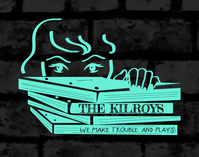
On their home page they write, We make trouble. And plays. Their first act of troublemaking was a list composed of 46 plays written by women. They compiled this list to combat "the systematic underrepresentation of female voices in the American theater."
Forty-six plays that I'm going to check out. I feel like a starving man who has just been ushered into the world's most exquisite buffet.
Though it's not the list of plays that caused me to stop everything today and blog. Rather, it was this phrase from the About section of their site that resonated with my values: "The Kilroys are a gang of playwrights and producers in LA who are done talking about gender parity and are ready to act."
I'm tired of all of the talking, too.
As many of you know, I am the co-founder of Boston Public Works Theater Company, a group of playwrights modeled after 13P. I formed this group with Kevin Mullins because, as much as anything, we were both tired of listening to playwrights complain about the traditional American theater system, and we decided to do something about it.
To appropriate a corporate slogan to our own use: Stop complaining and just do it.
Do. It. Don't talk. Do.
Those of you who are familiar with the 13P model know that each playwright acts as her or his own artistic director. In essence, each production would be a glimpse into what a theater would look like if that particular playwright ran it. In the case of Turtles, written by me, this is what the theater would look like.
I think gender parity is an important concern for theater makers across the United States. In Boston, I think race is a particularly important issue, perhaps even more important than gender. I think all forms of inclusion are important, including gender, race, sexual preference, and age. The latter is one that, as a man in his late fifties, I am particularly attuned to, and feels it is a category that is neglected. And how many times do you hear the double whammy from actresses of a certain age that there are no good roles for older women?
Every play I've written, except one, encourages diverse casts, and that one odd play just needs the cast to be the same race, but for years I've been going to Boston productions, almost always wondering why the cast and production team is white, except for perhaps when the script specifically calls for a non-white actor. You couldn't have cast a bi-racial family, I wonder? There are no blacks in the U.S. military? I didn't know that. There are no black or Latinos working at the Fulton Fish Market? That's news to me. It's pretty much an endless parade of white people here in Boston, no matter which theater you attend.
But you know, I've also always felt uneasy talking about the demographics of people who I know, care about, and work with in the theater. Seriously, what difference does it make what color their skin is (I'm white, but prefer to be called swarthy; that's a joke, for the ironically challenged), who they sleep with, or what year they were born? I've always been uneasy talking demographics, until today when I saw that line on The Kilroys' site.
I'm done talking. And I'm going to let my actions talk for me.
I've been done talking for awhile, I just didn't know it. A few years ago, a theater was interested in doing a reading of Turtles, but couldn't ethnically cast it. So I pulled the script. Do you know how much that hurt for me to do that, just out of grad school, and taking away an opportunity like that? But today, I'm proud of myself for doing that, and I wonder how many other playwrights would be willing to say to an artistic director, if your theater isn't diverse, all the way down through the production team, I'm pulling my plays? My bet is that very few playwrights would do that.
But I think that's one thing that theater artists can do to make real change. People will say anything. It's so easy to talk the talk. It's walking the walk that's hard. Actions speak a lot louder than words, we're taught. Don't support theaters that don't promote parity and diversity. Period. Don't buy tickets. Don't send them your plays. (Do them yourself!) You wouldn't support a business that wasn't. Why support theater that isn't either?
 RSS Feed
RSS Feed
